Relationship between speed, length and tiredness
Forum rules
The place for bushwalking topics that are not location specific.
The place for bushwalking topics that are not location specific.
18 posts
• Page 1 of 1
Relationship between speed, length and tiredness
Hi Guys,
I have been dong some training for the arthurs. I have noticed that I can walk 3k an hour for 10 hours or so and not feel stiff. However, walking 5 hours at 4 k an hour seems to take a lot more energy and I felt stiff the next day, even thought the distence covered is much less.
There must be a formular or relationship between length of walk, speed and distance. The other factor is rest time duing the walk. Does resting 10 minutes each hour really allow you to walk a few hours longer?
Any comments to the above questions?
I have been dong some training for the arthurs. I have noticed that I can walk 3k an hour for 10 hours or so and not feel stiff. However, walking 5 hours at 4 k an hour seems to take a lot more energy and I felt stiff the next day, even thought the distence covered is much less.
There must be a formular or relationship between length of walk, speed and distance. The other factor is rest time duing the walk. Does resting 10 minutes each hour really allow you to walk a few hours longer?
Any comments to the above questions?
- under10kg
- Athrotaxis cupressoides

- Posts: 320
- Joined: Mon 15 Oct, 2007 6:33 am
- Location: Australia
- Region: New South Wales
- Gender: Male
Re: Relationship between speed, length and tiredness
Good questions. I think it will be difficult to get objective, non-anecdotal answers though. For my part, I find that walking slower than my own comfortable speed (which is not terribly fast) gets me tired feet. Also, walking with shorter paces seems to wear me out more. I find that long rests are of no benefit to me at all. I only rest for long enough to catch my breath (or to take a photo or to eat my lunch) most times. That is rarely more than a couple of minutes.
Resting for longer makes you feel relaxed, but I don't think it makes much difference to how you feel 10 minutes after you've started walking again.
These are just my ow opinions from my own experience... I've no idea things worth the same for other people, or even if these opinions are based on reality rather than my own perception of reality.
Resting for longer makes you feel relaxed, but I don't think it makes much difference to how you feel 10 minutes after you've started walking again.
These are just my ow opinions from my own experience... I've no idea things worth the same for other people, or even if these opinions are based on reality rather than my own perception of reality.
- Son of a Beach
- Lagarostrobos franklinii

- Posts: 7023
- Joined: Thu 01 Mar, 2007 7:55 am
- ASSOCIATED ORGANISATIONS: Bit Map (NIXANZ)
- Region: Tasmania
- Gender: Male
Re: Relationship between speed, length and tiredness
Well from a physics point of view Energy = 0.5 x mass x velocity^2
So if you weigh 90kg all up with gear at 3km/h then kinetic energy = 0.5 x 90 x 3^2
= 405J
@ 4km/h kinetic energy = 0.5 x 90 x 43^2
= 720J
So at 3km/h your kinetic energy is only just over half that of 4km/h, 56% actually. Now this means very little, we should get all excited and do equations for energy required to accelerate your foot for each step etc. etc. but to what end. Most energy equations have a velocity^2 factor in them so in the end it should end up similarish. I'd be happy enough just saying you use like 40% less energy by going 25% slower.
So I guess that means you should be more tired after 10hrs at 3km/h than 5 hrs @ 4km/h - but not greatly, and you will have gone 50% further!
Of course I realise all this is a bit silly because it's a lot more complex with how the human body works and all, we aren't machines after all. (For example taking a break should make you more tired because you have to use energy to slow down to stop and to accelerate back up to 3/4km/h!)
Personally I do find walking slower easier but it all depends how I am feeling at the time (some times I just have no zoom zoom for no reason!). Rests are only helpful to catch my breath (my lungs tend to kak it before my legs) and also if I am totally buggered and out of 'petrol' in zombie mode (only happened once) they are handy. I'd rather walk slower without rests than faster and stop constantly.
I believe I read somewhere that if your body runs out of carbs or water you have to slow down as you have to burn your stored fats which are much slower at being converted to energy than carbs???
So if you weigh 90kg all up with gear at 3km/h then kinetic energy = 0.5 x 90 x 3^2
= 405J
@ 4km/h kinetic energy = 0.5 x 90 x 43^2
= 720J
So at 3km/h your kinetic energy is only just over half that of 4km/h, 56% actually. Now this means very little, we should get all excited and do equations for energy required to accelerate your foot for each step etc. etc. but to what end. Most energy equations have a velocity^2 factor in them so in the end it should end up similarish. I'd be happy enough just saying you use like 40% less energy by going 25% slower.
So I guess that means you should be more tired after 10hrs at 3km/h than 5 hrs @ 4km/h - but not greatly, and you will have gone 50% further!
Of course I realise all this is a bit silly because it's a lot more complex with how the human body works and all, we aren't machines after all. (For example taking a break should make you more tired because you have to use energy to slow down to stop and to accelerate back up to 3/4km/h!)
Personally I do find walking slower easier but it all depends how I am feeling at the time (some times I just have no zoom zoom for no reason!). Rests are only helpful to catch my breath (my lungs tend to kak it before my legs) and also if I am totally buggered and out of 'petrol' in zombie mode (only happened once) they are handy. I'd rather walk slower without rests than faster and stop constantly.
I believe I read somewhere that if your body runs out of carbs or water you have to slow down as you have to burn your stored fats which are much slower at being converted to energy than carbs???
"Don't do today what you can put off 'till tomorrow." (Work that is!)
-
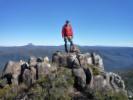
sthughes - Lagarostrobos franklinii

- Posts: 2427
- Joined: Wed 05 Mar, 2008 12:53 pm
- Location: Ulverstone
- Region: Tasmania
- Gender: Male
Re: Relationship between speed, length and tiredness
If we have any sports training or fitness experts on the forum, they may be able to provide some sort of scientific comments, but from my experience, I would agree with you that we each have an optimum pace that when set and maintained, can allow us to walk all day without feeling exhausted during the day, or at the end. If we exceed this we feel "stuffed" at the end of the day. This "comfortable" pace is all to do with our aerobic fitness level, and a rough guide to establishing your most efficient walking pace is to start slow and gradually increase your speed to the point where you can't maintain a conversation with your mates without gasping for air, throttle back a little so you can talk easily and that speed will be what you can stick with all day. Obviously this level of energy expenditure can only be maintained over varying terrain and slope changes, by varying your pace to suit. So the obvious thing is to slow down when going uphill and speed up when going downhill according to track conditions. A little more quantitative feedback can be obtained by using a heart rate monitor and see how you heart rate goes over different walking speeds, terrain types and steepness. You will find that there is a pulse rate zone that is your optimum for your current level of fitness and backpack weight, that will let you walk all day without getting exhausted. Rest stops at this optimum pace are more for enjoying the views, taking photos, having a snack, or waiting for slower members of your party to catch up. Another factor in energy expenditure while walking is how much energy is expended in moving your body and pack weight up and down as you walk. The more you can "glide" smoothly along the track using your foot placement and legs to smooth out the terrain, the less energy is wasted in dealing with gravity! A level track with lots of tree roots to negotiate, or tree limbs to climb under or over will take a lot more energy to negotiate, as we have all experienced.
"The world reveals itself to those who travel on foot."
Werner Herzog
Werner Herzog
-

tas-man - Athrotaxis selaginoides

- Posts: 1469
- Joined: Mon 03 Sep, 2007 8:55 pm
- Location: Riverside
- Region: Tasmania
- Gender: Male
Re: Relationship between speed, length and tiredness
Great comments.
I did notice one of the american long distance walkers uses a 10 minute break every hour and walk slow but 10 hours or more a day. He had breakfast lunch and dinner on the trail so this was 3 good rest times during walking.
I did notice one of the american long distance walkers uses a 10 minute break every hour and walk slow but 10 hours or more a day. He had breakfast lunch and dinner on the trail so this was 3 good rest times during walking.
- under10kg
- Athrotaxis cupressoides

- Posts: 320
- Joined: Mon 15 Oct, 2007 6:33 am
- Location: Australia
- Region: New South Wales
- Gender: Male
Re: Relationship between speed, length and tiredness
I dont understand the equasions just know my own body which tells me on the up hill to rest according to my heart rate,on the flat unlike most I prefer to keep standing on rest stops and I dont really like to have long rests other than say the lunch break.
c
c
collige virgo rosas
-

corvus - Vercundus gearus-freakius

- Posts: 5538
- Joined: Mon 23 Apr, 2007 7:24 pm
- Location: Devonport
- Region: Tasmania
- Gender: Male
Re: Relationship between speed, length and tiredness
I think you can probably take a little out of each post here. If you want to cover more km's in less time for longer periods ( which I think is your piont) then quite simply you have to train harder for longer periods on a consistant basis until you reach a level of fitness that your body can sustain the exercise you wish to achieve.
But there are many variables to take on board: most importantly rest, the right food intake, the terrain walked, your state of mind, weather, fluid intake, body structure and more.
As a triathete for many years I trained countless hours in gyms, spent many kms cycling on roads and cycling machines and many more running roads and beaches. There were not too many weeks where the group would'nt be in the gym five days, on the bike doing four to five hundred kms and running forty kms weekly.
I still train in all those areas but on a much less stunuous regime. this allows me to achieve a consistant 4 km/hr with around 18kl pack for 8 to 10 hrs and still feel good at the end of the day.
IMHO it's probably more important just to be out enjoying the scenery and occasionally stopping to smell the roses so to speak; but it's good to know your limits too.
But there are many variables to take on board: most importantly rest, the right food intake, the terrain walked, your state of mind, weather, fluid intake, body structure and more.
As a triathete for many years I trained countless hours in gyms, spent many kms cycling on roads and cycling machines and many more running roads and beaches. There were not too many weeks where the group would'nt be in the gym five days, on the bike doing four to five hundred kms and running forty kms weekly.
I still train in all those areas but on a much less stunuous regime. this allows me to achieve a consistant 4 km/hr with around 18kl pack for 8 to 10 hrs and still feel good at the end of the day.
IMHO it's probably more important just to be out enjoying the scenery and occasionally stopping to smell the roses so to speak; but it's good to know your limits too.
-

Ciaran - Atherosperma moschatum

- Posts: 73
- Joined: Sun 14 Dec, 2008 6:00 pm
- Location: Adelaide S.A.
Re: Relationship between speed, length and tiredness
All of the good points are relevant but sometimes we need to take into consideration AGE it is all very well to speak of all of those aerobic things however sometimes us older folks just need to take it slower because we are getting lighter .
For an example I used to weigh 85 kg and now 74kg so I need to adjust my pack weights to suit also I suffer from arthritis and occasional gout so I have additional obstacles to overcome .
So what do I do about this ,take the medicines (mostly natural other than panadol forte) think positive go walking with my mates and adjust my pace to suit which I have found is really good for all but the " sprinter " and in the long run adds only 30 to 40 mins as the final outcome to our destination
c
For an example I used to weigh 85 kg and now 74kg so I need to adjust my pack weights to suit also I suffer from arthritis and occasional gout so I have additional obstacles to overcome .
So what do I do about this ,take the medicines (mostly natural other than panadol forte) think positive go walking with my mates and adjust my pace to suit which I have found is really good for all but the " sprinter " and in the long run adds only 30 to 40 mins as the final outcome to our destination
c
collige virgo rosas
-

corvus - Vercundus gearus-freakius

- Posts: 5538
- Joined: Mon 23 Apr, 2007 7:24 pm
- Location: Devonport
- Region: Tasmania
- Gender: Male
Re: Relationship between speed, length and tiredness
Here are some graphs that I have found that might be of some interest to this topic, I found these while looking through some published articles to do with load carriage studies for the military.
Tony
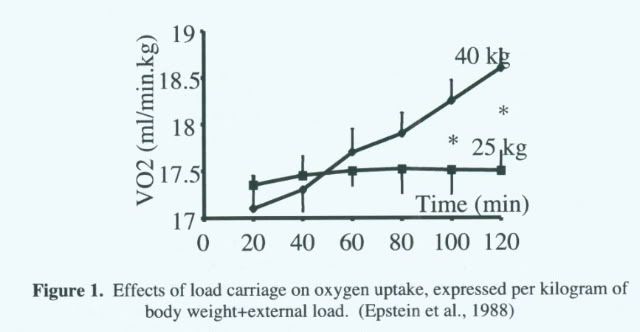
This shows how much more VO2 Max it takes to carry heavy loads vs time carried
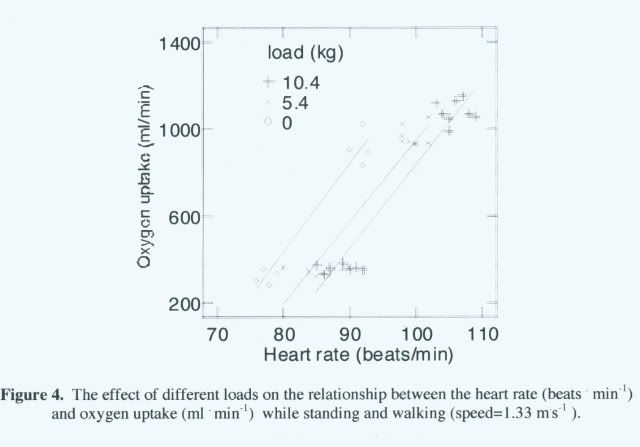
This shows Oxygen uptake vs heart rate while resting and carrying no load, 5.4kg and 10.4 kg while walking at just under 5 kph
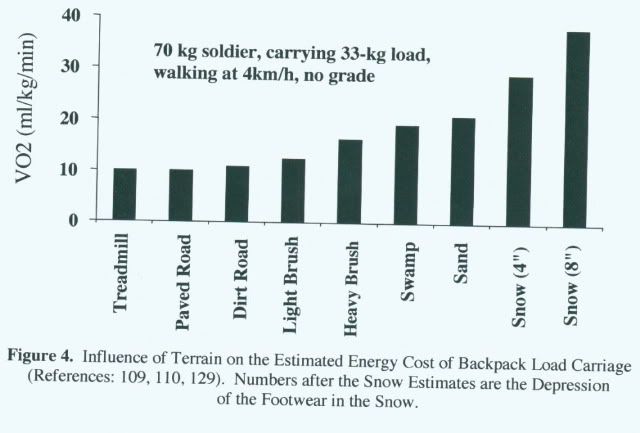
this shows the estimated energy cost of different terrains.
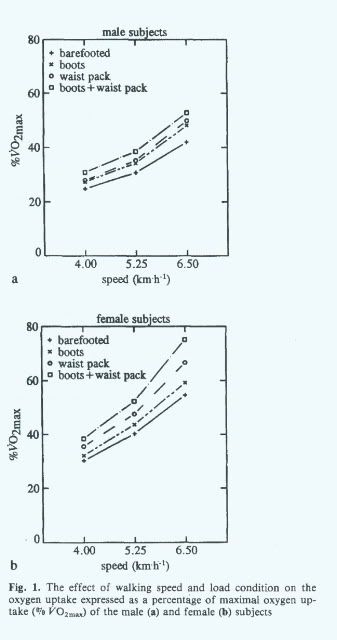
This shows increased heart rates while wearing no footwear, boots, waist pack and waist pack and boots

This last one is for Corvus and shows how we can slow down with age
Tony

This shows how much more VO2 Max it takes to carry heavy loads vs time carried

This shows Oxygen uptake vs heart rate while resting and carrying no load, 5.4kg and 10.4 kg while walking at just under 5 kph

this shows the estimated energy cost of different terrains.

This shows increased heart rates while wearing no footwear, boots, waist pack and waist pack and boots

This last one is for Corvus and shows how we can slow down with age
There is no such thing as bad weather.....only bad clothing. Norwegian Proverb
-

Tony - Athrotaxis selaginoides

- Posts: 1896
- Joined: Fri 16 May, 2008 1:40 pm
- Location: Canberra
- Region: Australian Capital Territory
Re: Relationship between speed, length and tiredness
Tony,
Many thanks for the Graphs its a pity that I dont really understand them having a non scientific mind but no doubt one of my younger BWT Strollers will enlighten me
corvus
Many thanks for the Graphs its a pity that I dont really understand them having a non scientific mind but no doubt one of my younger BWT Strollers will enlighten me
corvus
collige virgo rosas
-

corvus - Vercundus gearus-freakius

- Posts: 5538
- Joined: Mon 23 Apr, 2007 7:24 pm
- Location: Devonport
- Region: Tasmania
- Gender: Male
Re: Relationship between speed, length and tiredness
The other side of the equation is energy replacement; even if you have the cardiovascular fitness to walk faster than normal, you'll also need to eat more over a given period of time to replace the glycogen in your muscles; otherwise as sthughes pointed out you'll run out and need to burn stored body fat (and muscle) instead; which your body cannot do at a fast rate.
“No man ever steps in the same river twice, for it is not the same river and he is not the same man.” -Heraclitus
-

Singe - Athrotaxis cupressoides

- Posts: 244
- Joined: Wed 30 Apr, 2008 4:45 pm
- Region: New South Wales
- Gender: Male
Re: Relationship between speed, length and tiredness
All I know about this is it's a mental thing for me - I find that if I am following someone that is walking just a bit slower than my comfortable rate, I sometimes feel rather irritable.
And if I lead, I find it easier to walk at a normal pace, and stop to allow people to catch up, than to walk slower.
This is of course while carrying a heavy load.
I'm about 61 kg's, and my normal load is over 20KG's, sometimes as high as 27. And I'm into my 40's.
Hill climbs are something that I do differently to my wife too - I find that I climb slower than her up steep sections, eg the Arm River track steep bit.
Heading up to Trappers Hut one time I pushed on a bit hard and ended up dizzy and nauseous, I should have taken it slower and rested sooner.
Rest = recovery.
The one thing that will stuff me more than any other is if I want a drink and don't have water. That's BAD. Again, probably more psychological.
As for distance covered per day, it really has never been an issue because we usually know where we are going and it is always achievble - a big day for me would be 16KM, Arm River carpark to Frog Flats. But that's with all that weight too.
It would be interesting to leave all the camera gear behind and see how well we do, but we'd be regretting not having our cameras there when we go there, so horses for courses...
And if I lead, I find it easier to walk at a normal pace, and stop to allow people to catch up, than to walk slower.
This is of course while carrying a heavy load.
I'm about 61 kg's, and my normal load is over 20KG's, sometimes as high as 27. And I'm into my 40's.
Hill climbs are something that I do differently to my wife too - I find that I climb slower than her up steep sections, eg the Arm River track steep bit.
Heading up to Trappers Hut one time I pushed on a bit hard and ended up dizzy and nauseous, I should have taken it slower and rested sooner.
Rest = recovery.
The one thing that will stuff me more than any other is if I want a drink and don't have water. That's BAD. Again, probably more psychological.
As for distance covered per day, it really has never been an issue because we usually know where we are going and it is always achievble - a big day for me would be 16KM, Arm River carpark to Frog Flats. But that's with all that weight too.
It would be interesting to leave all the camera gear behind and see how well we do, but we'd be regretting not having our cameras there when we go there, so horses for courses...
-

tasadam - Magnus administratio

- Posts: 5940
- Joined: Tue 10 Apr, 2007 6:58 pm
- Location: Near Devonport, Tasmania
- ASSOCIATED ORGANISATIONS: TasmaniART, Smitten Merino, Macpac
- Region: Tasmania
- Gender: Male
Re: Relationship between speed, length and tiredness
I'm a physiotherapy student and have done a fair amount of exercise physiology in the last few years so I may be able to shed some light on the situation (hopefully in laymans terms).
A Brief introduction to Exercise Physiology of Walking and the relationship between Oxygen Consumption, Energy and Speed
When walking across level flat ground, speed and metabolic costs (energy costs) have a sort of parabolic relationship (no quite - but its important to note that it is certainly not linear). When walking as slow as possible you use energy to power muscles to resist the swing of your legs that naturally occurs when walking due to gravity. As you walk faster (or move into a jog/run) you power muscles (in a different manner) to propell your legs faster therefore your energy costs are going to rise. Optimal conservation of energy is going to vary a little bit between each individual but is usually balanced on the slower side of things (around 2-3km/h).
Your normal speed of walking (i.e. if your not making a concious effort to move quickly) is usually around the most energy economic way to walk. Out bodies are designed/developed over many years to move in a manner which is most energy efficient. Of course putting additional weight on your back and changing torrein is going to increase energy costs, however, the principles behind the energy-speed relationship are going to remain the same.
Where the differences come with walking uphill/adding weight to your back is that you are doing more work which requires more energy production which in turn requires more oxygen. If you have insufficient oxygen supply to the muscles (possibly because you aren't 'fit' enough) then your body will have to create energy by a different metabolic pathway (one which doesnt require Oxygen but is alot less efficient and has by-product of lactic acid). It will, as mentioned above, look to burn different fuels in order to get the oxygen - one of which is glucosen which can be readily taken from the bodies glycogen stores (instead of using up all the fat we all want to get rid of). Our stores of glycogen are alot smaller than that of fat, so once you have used it up your going to start feeling tired.
So in summary walking faster >>>> lack of oxygen to muscles (even in fit people especially once walking much faster) >>>> uses different metabolic pathways to get energy >>>> uses fuels that we have less off >>>> we run out faster >>>> feel tired (and want to eat)
at lowest possible power outputs 80% of your fuel comes from fats at the highest you can achieve 100% comes from carbs. If you want to burn fat at a maximum rate you need to work at around 65% of your maximum oxidative consumption possible (VO2 max) [which is more or less your maximum work output as work and VO2 are linearly related]
A good test for this is called the talk test (as tasman described above) - at the point in which you can no longer hold a conversation while exercising you using around 60-70% of your maximum oxygen consumption.
(this can also be estimated by using a formula that takes into account your maximum and resting heart rates)
The stiffness I assume you are talking about is delayed onset of muscle soreness (DOMs) and is worst 48hours after exercise? The scientific jury is still out on why this is caused.
One theory is that it is caused by lactic acid build up (although there are a number of mechanisms not explained by this theory). Lactic acid is a by product of using a metabolism pathway that doesnt require oxygen (used as a result of lack of oxygen in the muscles). As you increase your work (i.e. walk faster) if your ventilatory system can't keep up you are going to produce more lactic acid (due to burning different fuels) which will lead to more soreness (however, lactic acid has been shown to leave the muscles quite quickly - therefore it could be argued that it doesn't cause DOMs which are felt worst 48h after the event).
A more recent theory is that it is due to microtears in your muscle. They believe this occurs more when your muscles are used eccentrically (contract in manner that they lengthen rather than get shorter - I can give a better explanation if needed). Muscles are often used eccentrically to slow body parts down or to lower your body weight (explains why muscles are often so sore when you have been going downhill all day). So if for example you are swinging your legs faster during walking some of your muscles are going to have to work harder to slow the swing of the leg just before you place it on the ground. These harder working (eccentrically) muscles are more likely to get micro tears.
I Hope that made sense to the people which could be bothered to read it - If anyone has any questions just ask.
A Brief introduction to Exercise Physiology of Walking and the relationship between Oxygen Consumption, Energy and Speed
When walking across level flat ground, speed and metabolic costs (energy costs) have a sort of parabolic relationship (no quite - but its important to note that it is certainly not linear). When walking as slow as possible you use energy to power muscles to resist the swing of your legs that naturally occurs when walking due to gravity. As you walk faster (or move into a jog/run) you power muscles (in a different manner) to propell your legs faster therefore your energy costs are going to rise. Optimal conservation of energy is going to vary a little bit between each individual but is usually balanced on the slower side of things (around 2-3km/h).
Your normal speed of walking (i.e. if your not making a concious effort to move quickly) is usually around the most energy economic way to walk. Out bodies are designed/developed over many years to move in a manner which is most energy efficient. Of course putting additional weight on your back and changing torrein is going to increase energy costs, however, the principles behind the energy-speed relationship are going to remain the same.
Where the differences come with walking uphill/adding weight to your back is that you are doing more work which requires more energy production which in turn requires more oxygen. If you have insufficient oxygen supply to the muscles (possibly because you aren't 'fit' enough) then your body will have to create energy by a different metabolic pathway (one which doesnt require Oxygen but is alot less efficient and has by-product of lactic acid). It will, as mentioned above, look to burn different fuels in order to get the oxygen - one of which is glucosen which can be readily taken from the bodies glycogen stores (instead of using up all the fat we all want to get rid of). Our stores of glycogen are alot smaller than that of fat, so once you have used it up your going to start feeling tired.
So in summary walking faster >>>> lack of oxygen to muscles (even in fit people especially once walking much faster) >>>> uses different metabolic pathways to get energy >>>> uses fuels that we have less off >>>> we run out faster >>>> feel tired (and want to eat)
believe I read somewhere that if your body runs out of carbs or water you have to slow down as you have to burn your stored fats which are much slower at being converted to energy than carbs???
at lowest possible power outputs 80% of your fuel comes from fats at the highest you can achieve 100% comes from carbs. If you want to burn fat at a maximum rate you need to work at around 65% of your maximum oxidative consumption possible (VO2 max) [which is more or less your maximum work output as work and VO2 are linearly related]
A good test for this is called the talk test (as tasman described above) - at the point in which you can no longer hold a conversation while exercising you using around 60-70% of your maximum oxygen consumption.
(this can also be estimated by using a formula that takes into account your maximum and resting heart rates)
The stiffness I assume you are talking about is delayed onset of muscle soreness (DOMs) and is worst 48hours after exercise? The scientific jury is still out on why this is caused.
One theory is that it is caused by lactic acid build up (although there are a number of mechanisms not explained by this theory). Lactic acid is a by product of using a metabolism pathway that doesnt require oxygen (used as a result of lack of oxygen in the muscles). As you increase your work (i.e. walk faster) if your ventilatory system can't keep up you are going to produce more lactic acid (due to burning different fuels) which will lead to more soreness (however, lactic acid has been shown to leave the muscles quite quickly - therefore it could be argued that it doesn't cause DOMs which are felt worst 48h after the event).
A more recent theory is that it is due to microtears in your muscle. They believe this occurs more when your muscles are used eccentrically (contract in manner that they lengthen rather than get shorter - I can give a better explanation if needed). Muscles are often used eccentrically to slow body parts down or to lower your body weight (explains why muscles are often so sore when you have been going downhill all day). So if for example you are swinging your legs faster during walking some of your muscles are going to have to work harder to slow the swing of the leg just before you place it on the ground. These harder working (eccentrically) muscles are more likely to get micro tears.
I Hope that made sense to the people which could be bothered to read it - If anyone has any questions just ask.
You'll never walk alone
-

Ephebus - Nothofagus gunnii

- Posts: 18
- Joined: Fri 01 Aug, 2008 5:50 pm
- Location: Hills District, Sydney
Re: Relationship between speed, length and tiredness
Thanks Ephebus, interesting stuff. And thanks for the graphs Tony, I obviously need to walk barefoot with no pack, I'd use so much less energy I'd be able to walk forever!
Peak bagging points: 170ish
Recent walks - Picton, Wylds Crag, Rogoona
Recent walks - Picton, Wylds Crag, Rogoona
-

Taurë-rana - Athrotaxis selaginoides

- Posts: 1031
- Joined: Mon 14 Jan, 2008 8:28 pm
- Location: Devonport
- Region: Tasmania
Re: Relationship between speed, length and tiredness
Ephebus,
Wow what can I say !! great explanation guess I must just be a bit slow on the uptake so from now on I will keep to my "walk to my heart rate pace" and hope the hills get shorter
c
Wow what can I say !! great explanation guess I must just be a bit slow on the uptake so from now on I will keep to my "walk to my heart rate pace" and hope the hills get shorter
c
collige virgo rosas
-

corvus - Vercundus gearus-freakius

- Posts: 5538
- Joined: Mon 23 Apr, 2007 7:24 pm
- Location: Devonport
- Region: Tasmania
- Gender: Male
Re: Relationship between speed, length and tiredness
The heart rate will do me Corvus, particularly as our old tickers spin at about the same revs.
And Higg's track is a good one to get the rate up a bit. Not many flat spots on the way up, eh?
Flyfisher
And Higg's track is a good one to get the rate up a bit. Not many flat spots on the way up, eh?
Flyfisher
If you don't know what I'm talking about, then you need to drink more.
-

flyfisher - Athrotaxis selaginoides

- Posts: 1532
- Joined: Sat 14 Jul, 2007 8:39 pm
- Location: hobart
- ASSOCIATED ORGANISATIONS: landrover owners club of tasmania
- Region: Tasmania
Re: Relationship between speed, length and tiredness
I liked Ephebus' idea best - usual walking speed - how sensible. But I did love those graphs!! 
Lynda
- Lynda Moir
- Atherosperma moschatum

- Posts: 54
- Joined: Mon 11 Jun, 2007 2:05 pm
- Location: Perth WA
Re: Relationship between speed, length and tiredness
I notice Chickenfeed has HRMs for $30 at the moment... A chest strap under the pack straps might not be so comfortable though.
“No man ever steps in the same river twice, for it is not the same river and he is not the same man.” -Heraclitus
-

Singe - Athrotaxis cupressoides

- Posts: 244
- Joined: Wed 30 Apr, 2008 4:45 pm
- Region: New South Wales
- Gender: Male
18 posts
• Page 1 of 1
Return to Bushwalking Discussion
Who is online
Users browsing this forum: No registered users and 2 guests
